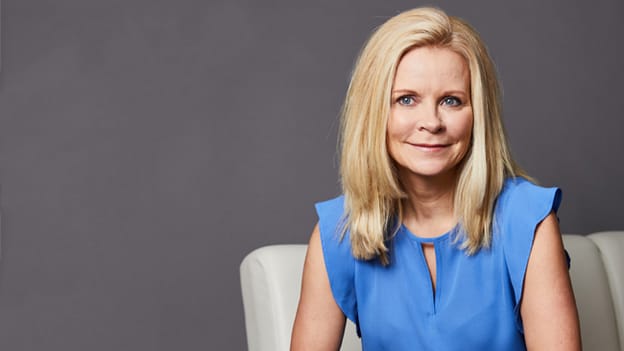Our focus is on creating an employee-first culture: Poly’s CHRO

Anja Hamilton serves as Executive Vice President and Chief Human Resources Officer at Poly. In this role, she is responsible for all aspects of human resources, including talent acquisition, inclusion and diversity, learning, succession management, engagement, compensation and benefits, health and well-being, and people solutions and systems.
Hamilton joined Poly in 2018 and has more than 20 years of experience in human resources leadership roles spanning the semiconductor, e-commerce, and entertainment industries. She has a successful track record of driving exponential growth through productivity-boosting people solutions and is an expert in creating high-performing, agile work teams.
Prior to joining Poly, Hamilton was Chief People Officer at Integrated Device Technology, Inc. (IDT) where she held a major role in accelerating IDT’s growth through aligning people with priorities, driving high engagement and loyalty, and elevating team performance by building a culture of continuous growth and learning. Prior to IDT, she held HR leadership roles at Atmel Corporation, eBay Inc., Electronic Arts Inc., and several start-up companies.
Hamilton holds a business administration degree from the College of Applied Sciences in Augsburg, Germany. Additionally, she holds several certifications in Human Resource Management and an advanced business administration/media technology degree from the Professional Academy for Media Tech in Munich, Germany.
In this exclusive interaction, Hamilton shares her take on post-pandemic trends like remote working, flexi hours, and other workplace trends that are here to stay and how they will impact the future of work. She also shares insights on how Poly is adapting to the changing times in terms of remote working, business continuity, and employee well-being.
Here are the excerpts from the interview.
How are you adapting to the changing times in terms of remote working, business continuity, and employee well-being?
As the world continues to battle COVID-19, our top priority at Poly has always been to protect the health and safety of our employees, stakeholders, and communities as we continue to serve our customers.
Remote working or working-from-anywhere has been a culture at Poly for many years now and almost all our employees were already equipped with collaboration tools like headsets and our USB cameras like Eagle Eye Mini; also, we had rolled out Microsoft Teams and Zoom as collaboration platforms for employees long before the pandemic to help them work and focus from anywhere. Therefore, ensuring business continuity was not an issue for us at Poly.
Also Read: Companies that succeed amid COVID-19 will be those that prioritize people: Walmart’s Donna Morris
To support employees with the full-time shift to remote working, we introduced internal programs and training sessions so that they could access information and tools regarding best practices of working from home.
With respect to employee well-being, we understand that this has been a very tough period and anxiety and stress levels are at an all-time high. At Poly, we have rolled out several employee well-being initiatives to help employees combat burnout - we have introduced online platforms like WHIL which provides programs to help people improve their mental well-being, performance, relationships, and sleep. We are also offering employee assistance programs wherein employees can connect with professionals to deal with any mental health, stress, depression, financial concerns, family issues, and well-being matters that they may have. We have also created internal groups where people can come together and share their talents with other employees. With this program, we’ve seen people with great skill sets come forward and take Tai Chi and Yoga sessions for our employees - this has helped boost employee morale.
How do you see the overall role of HR and people managers evolving amid this pandemic and what's the way forward for people and talent managers to make HR mission-critical for business?
In my opinion, human resource (HR) managers have always been mission-critical to businesses but ever since the outbreak of the pandemic, we have been put in the spotlight and are playing a crucial role in guiding organizations and employees out of this crisis.
We’re tasked with navigating the entire workforce through difficult challenges and changes and our focus will be on helping employees and business leaders re-skill for the new normal by rolling out initiatives and programs that help them thrive and be productive. During this stressful period, our focus will also be towards supporting and safeguarding our employees’ mental and physical well-being to create an employee-first culture.
During a crisis, it's necessary to adjust organizational, team, and individual goals, for both workforce and market-related reasons. To adjust to this shift, companies will have to change the way they evaluate employees
Working from home is going to grow beyond its pre-COVID-19 norms, as many experts say. What's your take on post-pandemic trends like remote working, flexi hours? What other trends do you think are here to stay and how will they impact the future of work?
The pandemic has shifted the mindset about remote working and many employers are realizing that when they equip their employees with the right collaboration tools, they are productive no matter where they are; employees are also happier as they are able to achieve a good work-life balance.
We foresee that the future of work will be hybrid working – we will see workers splitting their time between their home (office) and the office. Going forward, more work and collaboration will be done virtually.
Some of the other trends include:
- Hybrid working spaces: While home offices and co-working spaces are going to rise in prominence, we don’t see the traditional offices disappearing anytime soon. New collaboration spaces will pop up but there will still be a need for centralized company workspaces for idea generation and to give the workforce its sense of identity. For the post-pandemic scenario, the office real estate may be restructured, scaled-down, or take its form in a co-working space so that flexible workers can fulfill the craving of being alongside other people, without being tied to a specific desk or location.
- Hybrid working culture: Healthy work culture is crucial for any organization and it is imperative that companies shift their culture for the new hybrid work environment. New policies will have to be developed for the hybrid workforce and the management will need to be equipped with the skills to manage this shift. Companies will have to invest in communication and collaboration tools to monitor, engage, and interact with hybrid-working teams.
In a nutshell, for the future of work, HR managers will have to work towards creating consistent work experiences for employees, and managing a distributed workforce will be paramount for HR/business leaders.
To come out stronger from the COVID-19 crisis, there is a growing emphasis on workforce reskilling. What are your thoughts on this and how can organizations harness agile learning techniques to reskill employees for the larger digital transformation?
The market is shifting dramatically and having the right skillsets to thrive in this changing market is crucial.
I think that developing talent should start at the university level - universities need to rethink their curriculum and partner with private businesses to develop talent. The government also has a huge role to play in this as they should look at ways in which they can support institutes that help in reskilling talent. Companies should set aside development budgets for employees and we should protect this budget. Investment in online learning platforms will also go a long way in ensuring that our workforce is prepared for digital transformation.
What should be the top criteria for businesses to manage employee performance and productivity amid the uncertainty?
Due to the pandemic, employees might not be as productive due to crisis-induced circumstances. Many employees may be adjusting to fully-remote work, dealing with unexpected life changes, or juggling caregiving responsibilities. Hence, during a crisis, it’s necessary to adjust organizational, team, and individual goals, for both workforce and market-related reasons. To adjust to this shift, companies will have to change the way they evaluate employees.
At Poly, we use an outcome-based methodology for tracking and performance. Outcome-based performance allows us to help our employees focus on achieving measurable impact and not just on effort alone. Therefore, our employees are not evaluated on the number of hours they clock-in or their workplace location, instead, on the impact, they create in the organization.
How do you see the gender diversity landscape amid this crisis? According to McKinsey, progress on I&D could slow down during and after the crisis unless companies consciously focus on advancing diversity and fostering inclusion.
No, in fact, I think that moving to remote working environment has given us an opportunity to embrace diversity at a greater scale. In my opinion, the lack of flexibility offered by a workplace was the biggest enemy for diversity. For instance, some women with young kids used to find that the lack of flexible working options held them back from returning to the workplace. With the shift to remote working, we now have an opportunity to reach out and support women to enter back into the workforce and give them the option to work from anywhere.
Thanks to the shift to remote working, we can also reach out to underprivileged communities who will now have equal opportunities at the workplace without having to travel long distances.
I’m a firm believer that having a diverse culture is essential to any organization. At Poly, we believe that every employee has a voice, and make sure that every voice is heard and that all opinions are valued and appreciated.
Read more such stories from the September issue of our e-magazine on 'Jobs: Now & Beyond’
















